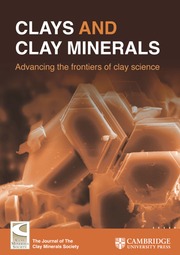Crossref Citations
This article has been cited by the following publications. This list is generated based on data provided by
Crossref.
Yan, Yonghong
Tillick, David A.
Peacor, Donald R.
and
Simmons, Stuart F.
2001.
Genesis of Dioctahedral Phyllosilicates During Hydrothermal Alteration of Volcanic Rocks: II. The Broadlands-Ohaaki Hydrothermal System, New Zealand.
Clays and Clay Minerals,
Vol. 49,
Issue. 2,
p.
141.
Kim, Jin-wook
and
Peacor, Donald R.
2002.
Crystal-Size Distributions of Clays During Episodic Diagenesis: The Salton Sea Geothermal System.
Clays and Clay Minerals,
Vol. 50,
Issue. 3,
p.
371.
Bauluz, Blanca
Peacor, Donald R.
and
Ylagan, Robert F.
2002.
Transmission Electron Microscopy Study of Smectite Illitization During Hydrothermal Alteration of a Rhyolitic Hyaloclastite From Ponza, Italy.
Clays and Clay Minerals,
Vol. 50,
Issue. 2,
p.
157.
Dong, H.
Peacor, D. R.
Merriman, R. J.
and
Kemp, S. J.
2002.
Brinrobertsite: a new R1 interstratified pyrophyllite/smectite-like clay mineral: characterization and geological origin.
Mineralogical Magazine,
Vol. 66,
Issue. 4,
p.
605.
Peacor, Donald R.
Bauluz, Blanca
Dong, Hailiang
Tillick, David
and
Yan, Yonghong
2002.
Transmission and Analytical Electron Microscopy Evidence for High Mg Contents of 1M Illite: Absence of 1M Polytypism in Normal Prograde Diagenetic Sequences of Pelitic Rocks.
Clays and Clay Minerals,
Vol. 50,
Issue. 6,
p.
757.
Giorgetti, G.
Mata, M. P.
and
Peacor, D. R.
2003.
Evolution of mineral assemblages and textures from sediment through hornfels in the Salton Sea Geothermal Field: Direct crystallization of phyllosilicates in a hydrothermal-metamorphic system.
Clay Minerals,
Vol. 38,
Issue. 1,
p.
113.
Inoue, Atsuyuki
Meunier, Alain
and
Beaufort, Daniel
2004.
Illite-Smectite Mixed-Layer Minerals in Felsic Volcaniclastic Rocks from Drill Cores, Kakkonda, Japan.
Clays and Clay Minerals,
Vol. 52,
Issue. 1,
p.
66.
Murakami, Takashi
Inoue, Atsuyuki
Lanson, Bruno
Meunier, Alain
and
Beaufort, Daniel
2005.
Illite-Smectite Mixed-Layer Minerals in the Hydrothermal Alteration of Volcanic Rocks: II. One-Dimensional HRTEM Structure Images and Formation Mechanisms.
Clays and Clay Minerals,
Vol. 53,
Issue. 5,
p.
440.
Inoue, Atsuyuki
Lanson, Bruno
Marques-Fernandes, Maria
Sakharov, Boris A.
Murakami, Takashi
Meunier, Alain
and
Beaufort, Daniel
2005.
Illite-Smectite Mixed-Layer Minerals in the Hydrothermal Alteration of Volcanic Rocks: I. One-Dimensional XRD Structure Analysis and Characterization of Component Layers.
Clays and Clay Minerals,
Vol. 53,
Issue. 5,
p.
423.
Castendyk, Devin N.
Mauk, Jeffrey L.
and
Webster, Jenny G.
2005.
A mineral quantification method for wall rocks at open pit mines, and application to the Martha Au–Ag mine, Waihi, New Zealand.
Applied Geochemistry,
Vol. 20,
Issue. 1,
p.
135.
Galán, E.
2006.
Handbook of Clay Science.
Vol. 1,
Issue. ,
p.
1129.
Monecke, T.
Giorgetti, G.
Scholtysek, O.
Kleeberg, R.
Götze, J.
Hannington, M.D.
and
Petersen, S.
2007.
Textural and mineralogical changes associated with the incipient hydrothermal alteration of glassy dacite at the submarine PACMANUS hydrothermal system, eastern Manus Basin.
Journal of Volcanology and Geothermal Research,
Vol. 160,
Issue. 1-2,
p.
23.
Giorgetti, G.
Aghib, F. S.
Livi, K. J. T.
Gaillot, A.-C.
and
Wilson, T. J.
2007.
Newly formed phyllosilicates in rock matrices and fractures from CRP-3 core (Antarctica): an electron microscopy study.
Clay Minerals,
Vol. 42,
Issue. 1,
p.
21.
Bongiolo, Everton Marques
Patrier-Mas, Patricia
Mexias, André Sampaio
Beaufort, Daniel
and
Formoso, Milton Luiz Laquintinie
2008.
Spatial and temporal evolution of hydrothermal alteration at Lavras do sul, Brazil: Evidence from dioctahedral clay minerals.
Clays and Clay Minerals,
Vol. 56,
Issue. 2,
p.
222.
Murphy, David M. K.
and
Gilkes, Robert J.
2010.
Clay Minerals in Saprolite Overlying Hydrothermally Altered and Unaltered Rocks, Vera Epithermal Gold Deposit, Australia.
Clays and Clay Minerals,
Vol. 58,
Issue. 6,
p.
783.
Dubacq, Benoît
Vidal, Olivier
and
De Andrade, Vincent
2010.
Dehydration of dioctahedral aluminous phyllosilicates: thermodynamic modelling and implications for thermobarometric estimates.
Contributions to Mineralogy and Petrology,
Vol. 159,
Issue. 2,
p.
159.
Caracciolo, Luca
Le Pera, Emilia
Muto, Francesco
and
Perri, Francesco
2011.
Sandstone petrology and mudstone geochemistry of the Peruc–Korycany Formation (Bohemian Cretaceous Basin, Czech Republic).
International Geology Review,
Vol. 53,
Issue. 9,
p.
1003.
Bauluz, Blanca
2013.
Minerals at the Nanoscale.
p.
181.
Bozkaya, Ömer
Bozkaya, Gülcan
Uysal, I. Tonguç
and
Banks, David A.
2016.
Illite occurrences related to volcanic-hosted hydrothermal mineralization in the Biga Peninsula, NW Turkey: Implications for the age and origin of fluids.
Ore Geology Reviews,
Vol. 76,
Issue. ,
p.
35.
Vazquez, Mercedes
Bauluz, Blanca
Nieto, Fernando
and
Morata, Diego
2016.
Illitization sequence controlled by temperature in volcanic geothermal systems: The Tinguiririca geothermal field, Andean Cordillera, Central Chile.
Applied Clay Science,
Vol. 134,
Issue. ,
p.
221.


